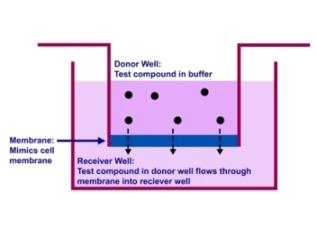Parallel Artificial Membrane Permeability Assay (PAMPA) Kit
Application
- For quantitative determination of gastrointestinal (GI) membrane permeability of test compounds.
Key Features
- Convenient. Includes all necessary equipment to run a PAMPA plate.
- Simple and low-cost. Procedure is easy to follow and more affordable than cell-based permeability assays.
- High-throughput. Can be readily automated as a high-throughput 96-well plate assay for thousands of samples per day.
Method
- PAMPA
Samples
- Chemical compounds
Species
- All
Procedure
- Assay takes 20 hr, hands-on time 1 hr
Size
- 96 tests
Shelf Life
- 12 months
More Details
- MEMBRANE PERMEABILITY is an important characteristic to determine for evaluating compounds as potential drug candidates. Drugs often need to cross cell membranes in order to reach their target of action and this makes a compound’s ability to passively cross these membranes an important characteristic to evaluate. Permeability can be evaluated by cell-based methods; however, these methods are often expensive and time consuming. Parallel Artificial Permeability Assays (PAMPA) offer researchers a quick, inexpensive method of evaluating the gastrointestinal (GI) permeability of test compounds. BioAssay Systems’ PAMPA Kit provides all the necessary components to run a Parallel Artificial Permeability Assay.
What are the Permeability Controls?
The High, Medium, and Low Permeability Controls are 10mM stock solutions of Chloramphenicol, Diclofenac, and Theophylline, respectively, in DMSO.
What other materials are required to run the assay?
Pipetting devices, DMSO, PBS, UV Plates (Cat # P96UV), and an absorbance plate reader capable of absorbance spectra.
What is the membrane of the donor plate?
The donor plate membrane is a Hydrophobic PVDF membrane with a pore size of 0.45 µm.
My test compounds aren’t soluble at 500 µM in PBS. Can I use higher concentrations of DMSO in the PAMPA assay?
We recommend against using higher concentrations of DMSO in the PAMPA assay. The spectrophotometric background in the Acceptor solution will increase with higher DMSO concentrations, and the higher concentration of DMSO may alter the membrane and affect the result.
If your compound(s) is/are insoluble in PBS with 5% DMSO, clarify the solution by centrifugation at 13,000xg for 10 minutes then use the supernatant for the Donor solution. The Donor solution is used in place of “500 µM Test Compound”. Since some of the compound was centrifuged out, the new concentration is unknown, so it is instead referred to as Donor Solution.
For the Equilibrium Standard, mix 80 µL of the new Donor Solution with 120 µL of PBS.
No citations for this new product. Please check back later. You may click here to check if citations are available, but are not listed here yet.
If you or your labs do not have the equipment or scientists necessary to run this assay, BioAssay Systems can perform the service for you.
– Fast turnaround
– Quality data
– Low cost
Please email or call 1-510-782-9988 x 2 to discuss your projects.

$509.00
For bulk quote or custom reagents, please email or call 1-510-782-9988 x 1.
Orders are shipped the same day if placed by 2pm PST
Shipping: RT
Carrier: Fedex
Delivery: 1-2 days (US), 3-6 days (Intl)
Storage: -20°C upon receipt
Related Products
You may also like…
| Name | SKU | Price | Buy |
|---|---|---|---|
| 96-Well UV Plate | P96UV | $36.00 |
Why BioAssay Systems
Quality and User-friendly • Expert Technical Support • Competitive Prices • Expansive Catalogue • Trusted Globally
